| Listing 1 - 10 of 25 | << page >> |
Sort by
|
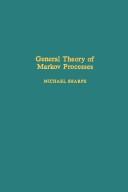
ISBN: 0126390606 9780080874531 0080874533 1281767573 9786611767570 9780126390605 Year: 1988 Volume: 133 Publisher: London Academic press
Abstract | Keywords | Export | Availability | Bookmark
 Loading...
Loading...Choose an application
- Reference Manager
- EndNote
- RefWorks (Direct export to RefWorks)
General theory of Markov processes
Stochastic processes --- Markov processes --- Markov, Processus de --- Markov processes. --- Stochastic processes. --- Random processes --- Probabilities --- Analysis, Markov --- Chains, Markov --- Markoff processes --- Markov analysis --- Markov chains --- Markov models --- Models, Markov --- Processes, Markov --- 519.217 --- 519.217 Markov processes
Book
ISBN: 9780124077959 9780124078390 0124077951 0124078397 Year: 2013 Publisher: London
Abstract | Keywords | Export | Availability | Bookmark
 Loading...
Loading...Choose an application
- Reference Manager
- EndNote
- RefWorks (Direct export to RefWorks)
Markov processes are processes that have limited memory. In particular, their dependence on the past is only through the previous state. They are used to model the behavior of many systems including communications systems, transportation networks, image segmentation and analysis, biological systems and DNA sequence analysis, random atomic motion and diffusion in physics, social mobility, population studies, epidemiology, animal and insect migration, queueing systems, resource management, dams, financial engineering, actuarial science, and decision systems. Covering a wide range of
Markov processes --- Stochastic processes --- Markov, Processus de --- Processus stochastiques --- Mathematics --- Physical Sciences & Mathematics --- Mathematical Statistics --- Markov processes. --- Stochastic processes. --- Random processes --- Analysis, Markov --- Chains, Markov --- Markoff processes --- Markov analysis --- Markov chains --- Markov models --- Models, Markov --- Processes, Markov --- Probabilities
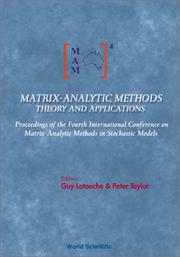
ISBN: 1281929530 9786611929534 9812777164 9789812777164 9812380515 9789812380517 9781281929532 6611929533 Year: 2002 Publisher: New Jersey World Scientific
Abstract | Keywords | Export | Availability | Bookmark
 Loading...
Loading...Choose an application
- Reference Manager
- EndNote
- RefWorks (Direct export to RefWorks)
Matrix-analytic methods are fundamental to the analysis of a family of Markov processes rich in structure and of wide applicability. They are extensively used in the modelling and performance analysis of computer systems, telecommunication networks, network protocols and many other stochastic systems of current commercial and engineering interest.This volume deals with: (1) various aspects of the theory of block-structured Markov chains; (2) analysis of complex queueing models; and (3) parameter estimation and specific applications to such areas as cellular mobile systems, FS-ALOHA, the Intern
Markov processes --- Queuing theory --- Matrices --- Stochastic processes --- Algebra, Matrix --- Cracovians (Mathematics) --- Matrix algebra --- Matrixes (Algebra) --- Algebra, Abstract --- Algebra, Universal --- Markov, Processus de --- Files d'attente, Théorie des --- Processus stochastiques --- Congresses. --- Congresses --- Congrès
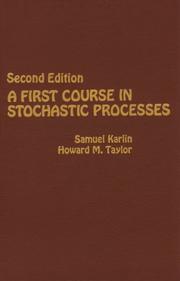
ISBN: 0123985528 9786613612267 0080570410 1280582480 9780080570419 9780123985521 Year: 2011 Publisher: San Diego, Calif. Academic Press
Abstract | Keywords | Export | Availability | Bookmark
 Loading...
Loading...Choose an application
- Reference Manager
- EndNote
- RefWorks (Direct export to RefWorks)
The purpose, level, and style of this new edition conform to the tenets set forth in the original preface. The authors continue with their tack of developing simultaneously theory and applications, intertwined so that they refurbish and elucidate each other.The authors have made three main kinds of changes. First, they have enlarged on the topics treated in the first edition. Second, they have added many exercises and problems at the end of each chapter. Third, and most important, they have supplied, in new chapters, broad introductory discussions of several classes of stochastic processe
Stochastic processes --- 519.216 --- 519.2 --- Random processes --- Probabilities --- 519.216 Stochastic processes in general. Prediction theory. Stopping times. Martingales --- Stochastic processes in general. Prediction theory. Stopping times. Martingales --- Stochastic Processes --- Processus stochastiques --- Stochastic Processes. --- Stochastic processes. --- Probabilités. --- Markov, Processus de --- Markov processes --- Probabilités.
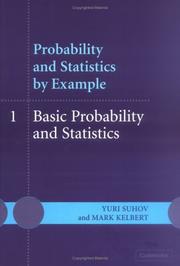
ISBN: 9780521612340 9780521847674 9780511813641 0521612330 9780521612333 9780521847667 0521847664 0521612349 0521847672 9780511813634 0511132832 9780511132834 9780511201158 051120115X 1107152801 9781107152809 1282466909 9781282466906 9786612466908 6612466901 0511644035 9780511644030 0511813635 0511567855 9780511567858 0511132298 9780511132292 9780511649509 0511649509 9780511567865 0511567863 1107175674 0511454139 0511813643 0511455178 Year: 2005 Volume: 2 Publisher: Cambridge Cambridge University Press
Abstract | Keywords | Export | Availability | Bookmark
 Loading...
Loading...Choose an application
- Reference Manager
- EndNote
- RefWorks (Direct export to RefWorks)
Probability and Statistics are as much about intuition and problem solving as they are about theorem proving. Because of this, students can find it very difficult to make a successful transition from lectures to examinations to practice, since the problems involved can vary so much in nature. Since the subject is critical in many modern applications such as mathematical finance, quantitative management, telecommunications, signal processing, bioinformatics, as well as traditional ones such as insurance, social science andengineering, the authors have rectified deficiencies in traditional lecture-based methods by collecting together a wealth of exercises with complete solutions, adapted to needs and skills of students. Following on from the success of Probability and Statistics by Example: Basic Probability and Statistics, the authors here concentrate on random processes, particularly Markov processes, emphasising modelsrather than general constructions. Basic mathematical facts are supplied as and when they are needed andhistorical information is sprinkled throughout.
Stochastic processes --- Mathematical statistics --- Probabilities. --- Mathematical statistics. --- Probabilities --- Probabilités --- Statistique mathématique --- Mathematics --- Statistical inference --- Statistics, Mathematical --- Statistics --- Sampling (Statistics) --- Probability --- Combinations --- Chance --- Least squares --- Risk --- Statistical methods --- Statistique mathématique --- Probabilités. --- Distribution (théorie des probabilités) --- Distribution (Probability theory) --- Markov, Processus de --- Markov processes --- Statistique mathématique. --- Distribution (théorie des probabilités) --- Markov processes. --- Statistique mathematique
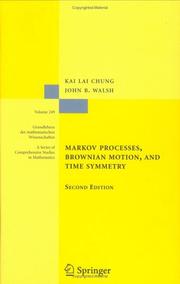
ISBN: 9780387286969 9780387220260 0387220267 1441919600 0387286969 Year: 2005 Publisher: New York, NY Springer Science+Business Media Inc.
Abstract | Keywords | Export | Availability | Bookmark
 Loading...
Loading...Choose an application
- Reference Manager
- EndNote
- RefWorks (Direct export to RefWorks)
From the reviews of the First Edition: "This excellent book is based on several sets of lecture notes written over a decade and has its origin in a one-semester course given by the author at the ETH, Zürich, in the spring of 1970. The author's aim was to present some of the best features of Markov processes and, in particular, of Brownian motion with a minimum of prerequisites and technicalities. The reader who becomes acquainted with the volume cannot but agree with the reviewer that the author was very successful in accomplishing this goal…The volume is very useful for people who wish to learn Markov processes but it seems to the reviewer that it is also of great interest to specialists in this area who could derive much stimulus from it. One can be convinced that it will receive wide circulation." (Mathematical Reviews) This new edition contains 9 new chapters which include new exercises, references, and multiple corrections throughout the original text.
stochastische analyse --- kansrekening --- Operational research. Game theory --- Markov processes --- Brownian motion processes --- Markov, Processus de --- Mouvement brownien, Processus de --- EPUB-LIV-FT SPRINGER-B LIVMATHE --- Distribution (Probability theory. --- Probability Theory and Stochastic Processes. --- Distribution functions --- Frequency distribution --- Characteristic functions --- Probabilities --- Markov processes. --- Brownian motion processes. --- Probabilities. --- Probability --- Statistical inference --- Combinations --- Mathematics --- Chance --- Least squares --- Mathematical statistics --- Risk
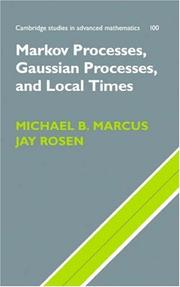
ISBN: 9780521863001 0521863007 9780511617997 9781107403758 9780511246968 051124696X 0511244819 9780511244810 0511245564 9780511245565 1107168775 1280703636 9786610703630 0511246293 0511322909 0511617992 Year: 2006 Volume: 100 Publisher: Cambridge Cambridge university press
Abstract | Keywords | Export | Availability | Bookmark
 Loading...
Loading...Choose an application
- Reference Manager
- EndNote
- RefWorks (Direct export to RefWorks)
This book was first published in 2006. Written by two of the foremost researchers in the field, this book studies the local times of Markov processes by employing isomorphism theorems that relate them to certain associated Gaussian processes. It builds to this material through self-contained but harmonized 'mini-courses' on the relevant ingredients, which assume only knowledge of measure-theoretic probability. The streamlined selection of topics creates an easy entrance for students and experts in related fields. The book starts by developing the fundamentals of Markov process theory and then of Gaussian process theory, including sample path properties. It then proceeds to more advanced results, bringing the reader to the heart of contemporary research. It presents the remarkable isomorphism theorems of Dynkin and Eisenbaum and then shows how they can be applied to obtain new properties of Markov processes by using well-established techniques in Gaussian process theory. This original, readable book will appeal to both researchers and advanced graduate students.
Markov processes --- Gaussian processes --- Local times (Stochastic processes) --- Markov, Processus de --- Processus gaussiens --- Temps locaux (Processus stochastiques) --- Analysis, Markov --- Chains, Markov --- Markoff processes --- Markov analysis --- Markov chains --- Markov models --- Models, Markov --- Processes, Markov --- Stochastic processes --- Sojourn time densities (Stochastic processes) --- Distribution (Probability theory) --- Markov processes. --- Gaussian processes.
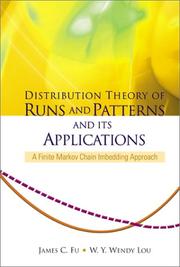
ISBN: 1281937983 9786611937980 9812779205 9789812779205 9781281937988 9789810245870 9810245874 Year: 2003 Publisher: River Edge, N.J. World Scientific
Abstract | Keywords | Export | Availability | Bookmark
 Loading...
Loading...Choose an application
- Reference Manager
- EndNote
- RefWorks (Direct export to RefWorks)
This book provides a rigorous, comprehensive introduction to the finite Markov chain imbedding technique for studying the distributions of runs and patterns from a unified and intuitive viewpoint, away from the lines of traditional combinatorics. The central theme of this approach is to properly imbed the random variables of interest into the framework of a finite Markov chain, and the resulting representations of the underlying distributions are compact and very amenable to further study of associated properties. The concept of finite Markov chain imbedding is systematically developed, and i
Markov processes. --- Random variables. --- Distribution (Probability theory) --- Distribution functions --- Frequency distribution --- Characteristic functions --- Probabilities --- Chance variables --- Stochastic variables --- Variables (Mathematics) --- Analysis, Markov --- Chains, Markov --- Markoff processes --- Markov analysis --- Markov chains --- Markov models --- Models, Markov --- Processes, Markov --- Stochastic processes --- Markov, Processus de --- Variables aléatoires --- Distribution (Théorie des probabilités)
Book
ISBN: 0122092503 9780122092503 Year: 1970 Volume: v. 67 Publisher: New York (N.Y.): Academic press
Abstract | Keywords | Export | Availability | Bookmark
 Loading...
Loading...Choose an application
- Reference Manager
- EndNote
- RefWorks (Direct export to RefWorks)
Stochastic processes --- Dynamic programming. --- Markov processes. --- Statistical decision. --- Dynamic programming --- Markov processes --- Statistical decision --- Civil & Environmental Engineering --- Engineering & Applied Sciences --- Operations Research --- Decision problems --- Game theory --- Operations research --- Statistics --- Management science --- Analysis, Markov --- Chains, Markov --- Markoff processes --- Markov analysis --- Markov chains --- Markov models --- Models, Markov --- Processes, Markov --- Mathematical optimization --- Programming (Mathematics) --- Systems engineering --- 519.217 --- 519.217 Markov processes --- Programmation dynamique. --- Markov, Processus de. --- Prise de décision (statistique)
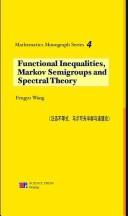
ISBN: 7030144155 9780080532073 0080532071 9780080449425 0080449425 9787030144157 1281144681 9781281144683 9786611144685 6611144684 Year: 2005 Publisher: Beijing ; New York : Science press,
Abstract | Keywords | Export | Availability | Bookmark
 Loading...
Loading...Choose an application
- Reference Manager
- EndNote
- RefWorks (Direct export to RefWorks)
In this book, the functional inequalities are introduced to describe:(i) the spectrum of the generator: the essential and discrete spectrums, high order eigenvalues, the principle eigenvalue, and the spectral gap;(ii) the semigroup properties: the uniform intergrability, the compactness, the convergence rate, and the existence of density;(iii) the reference measure and the intrinsic metric: the concentration, the isoperimetic inequality, and the transportation cost inequality.
Ordered algebraic structures --- Stochastic processes --- Inequalities (Mathematics) --- Semigroups of operators. --- Dirichlet forms --- Markov processes --- Spectral theory (Mathematics) --- Inégalités (Mathématiques) --- Semi-groupes d'opérateurs --- Dirichlet, Formes de --- Markov, Processus de --- Spectre (Mathématiques) --- ELSEVIER-B EPUB-LIV-FT --- Semigroups. --- Markov processes. --- Functional analysis --- Hilbert space --- Measure theory --- Transformations (Mathematics) --- Analysis, Markov --- Chains, Markov --- Markoff processes --- Markov analysis --- Markov chains --- Markov models --- Models, Markov --- Processes, Markov --- Group theory --- Processes, Infinite
| Listing 1 - 10 of 25 | << page >> |
Sort by
|

 Search
Search Feedback
Feedback About UniCat
About UniCat  Help
Help News
News